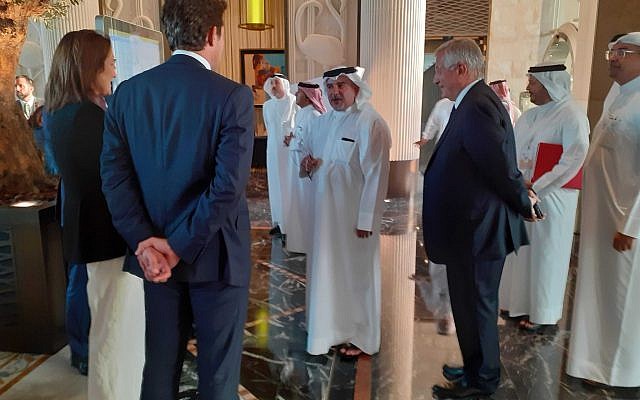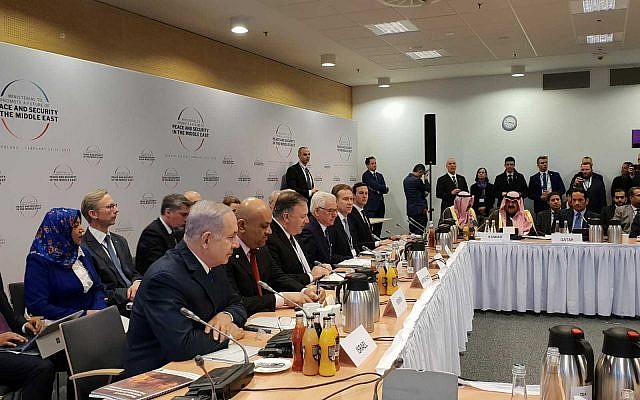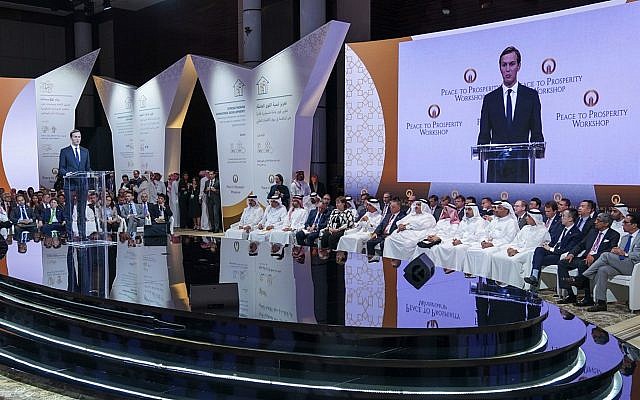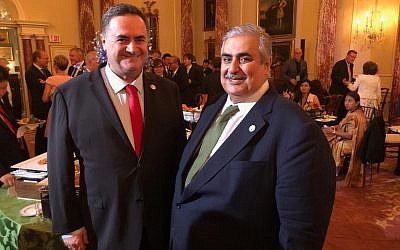Foreign Ministry’s regional security and counter-terrorism head to make rare formal trip to Arab state for Monday meet on maritime and civil aviation security

A senior official is confirmed to attend a security conference in Bahrain on Monday, a source in the Gulf country told The Times of Israel, in the latest significant sign of warming ties between parts of the Arab world and Israel.
Dana Benvenisti-Gabay, who directs the Foreign Ministry’s regional security and counter-terrorism department, will represent Israel at the Working Group on Maritime and Aviation Security.
Starting Monday, the two-day event is expected to deal mainly with efforts to thwart the Islamic Republic’s growing regional aggression. Delegates are set to discuss the protection of vessels in the Persian Gulf from Iranian attacks, as well as the prevention of the smuggling of weapons and weapons of mass destruction and the protection of civil aviation.
The meeting, co-hosted by Bahrain, the US and Poland, is part of the so-called Warsaw Process, which started with the Ministerial to Promote a Future of Peace and Security in the Middle East that took place in the Polish capital earlier this year. That conference, co-sponsored by Poland and the US, was originally billed as part of global efforts to counter Iran, but was later toned-down and instead focused on the vaguer goal of seeking stability in the Middle East.
The Foreign Ministry did not deny that it was sending a representative to Manama for the conference on maritime and aviation security. In a terse statement sent to The Times of Israel, the ministry said: “Israel participates in the post-Warsaw process.”
The two-day Bahrain conference will not be the first time Israeli and Arab officials sit together in the context of the Warsaw process. On October 8, an Israeli representative sat with colleagues from Bahrain, Saudi Arabia, United Arab Emirates, Yemen and other Arab states at a conference on cybersecurity in Seoul.

Three days later, Benjamin Krasna, Israel’s deputy ambassador to the US, participated in the Warsaw working group on human rights in Washington, which was also attended by many Arab countries.
Prime Minister Benjamin Netanyahu attended the original Warsaw conference in February, along with senior dignitaries from the Arab world.
During the summit, he sat next to the Yemeni foreign minister. At a closed event on the sidelines of the meeting, which Netanyahu attended, the foreign ministers of several Arab states openly discussed the notion that the Iranian threat was a more pressing concern for the region than the lingering Israeli-Palestinian conflict.

Israeli and US officials hailed the event as a breakthrough.
“Tonight I believe we are beginning a new era, with Prime Minister Netanyahu from the State of Israel, with leaders from Bahrain, Saudi Arabia, and the UAE, all breaking bread together, and later in this conference sharing honest perspectives on the challenges facing the area,” US Vice President Mike Pence said at the summit.
“Poland and the US welcome this outward symbol of this gathering, a symbol of cooperation and a hopeful sign of a brighter future that awaits nations across the Middle East,” Pence said.
Like most Arab states, Bahrain does not have diplomatic ties with Israel, though there has been an opening between the two in recent years amid their shared antipathy toward Iran.
In June, Bahrain hosted an American-led conference where US President Donald Trump’s peace team rolled out the economic aspects of its long-awaited proposal to solve the Israeli-Palestinian conflict.

While no Israeli officials were there, a number of the country’s businessmen and journalists were invited to attend the workshop.
“Israel is a country in the region.. and it’s there to stay, of course,” Bahraini Foreign Minister Khalid bin Ahmed Al-Khalifa told The Times of Israel at the time in an unprecedented interview.
In July, Foreign Minister Israel Katz met Al-Khalifa for a brief chat on Iran in Washington and the two posed for a rare photograph, marking what Jerusalem said was a boost in ties with the Gulf nation.

The Monday conference’s stated focus on air and maritime navigation comes amid heightened tensions in the Gulf between the US and Iran since May last year when Trump unilaterally abandoned a 2015 nuclear deal between major powers and Iran, and began reimposing crippling sanctions in a campaign of “maximum pressure.”
They flared again this May when Iran began reducing its own commitments under the deal and the US deployed military assets to the region.
Since then, ships have been attacked, drones downed and oil tankers seized.
Twin attacks in recent weeks on Saudi oil infrastructure, which knocked out half the kingdom’s production, drew accusations of blame from Washington and Europe. Tehran has denied any involvement in the attacks, which were claimed by Iran-backed rebels fighting a Saudi-led coalition in Yemen.
As reported by The Times of Israel
